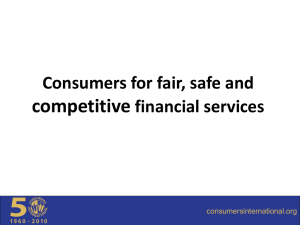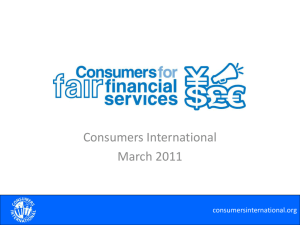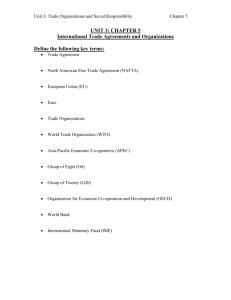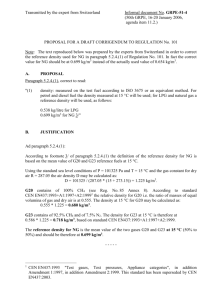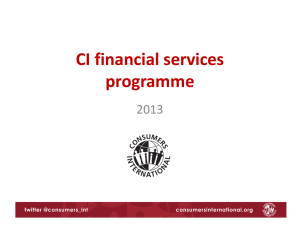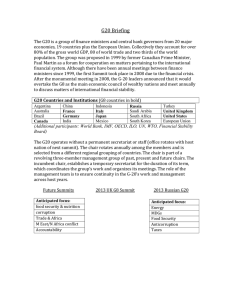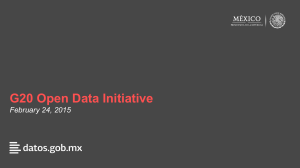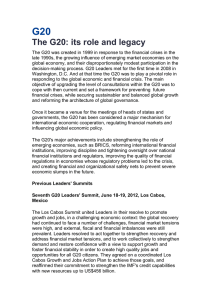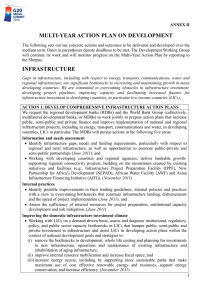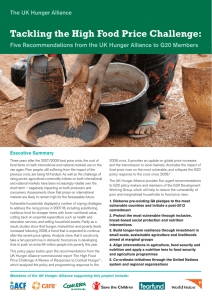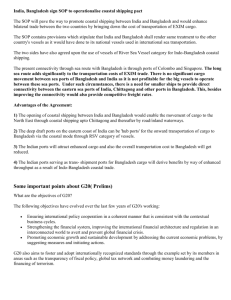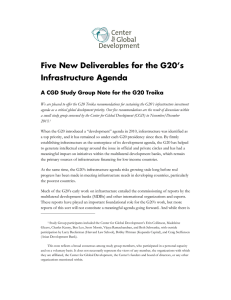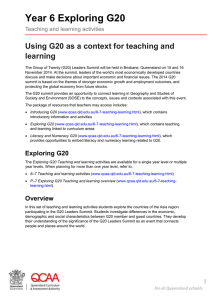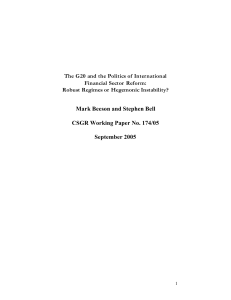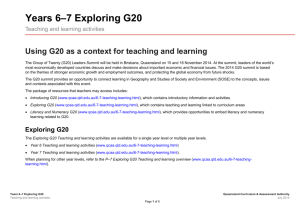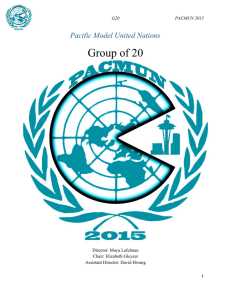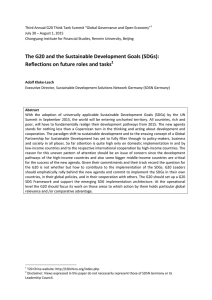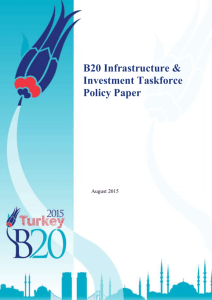1 Chairs' Summary Comprehensive social protection systems for
advertisement
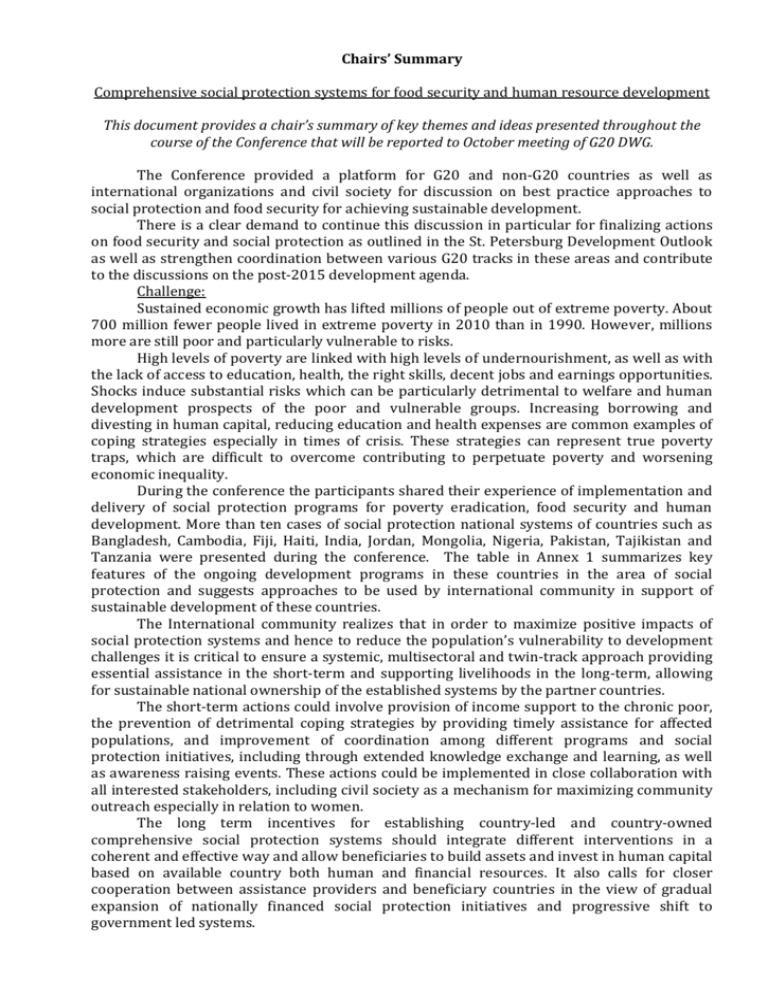
Chairs’ Summary Comprehensive social protection systems for food security and human resource development This document provides a chair’s summary of key themes and ideas presented throughout the course of the Conference that will be reported to October meeting of G20 DWG. The Conference provided a platform for G20 and non-G20 countries as well as international organizations and civil society for discussion on best practice approaches to social protection and food security for achieving sustainable development. There is a clear demand to continue this discussion in particular for finalizing actions on food security and social protection as outlined in the St. Petersburg Development Outlook as well as strengthen coordination between various G20 tracks in these areas and contribute to the discussions on the post-2015 development agenda. Challenge: Sustained economic growth has lifted millions of people out of extreme poverty. About 700 million fewer people lived in extreme poverty in 2010 than in 1990. However, millions more are still poor and particularly vulnerable to risks. High levels of poverty are linked with high levels of undernourishment, as well as with the lack of access to education, health, the right skills, decent jobs and earnings opportunities. Shocks induce substantial risks which can be particularly detrimental to welfare and human development prospects of the poor and vulnerable groups. Increasing borrowing and divesting in human capital, reducing education and health expenses are common examples of coping strategies especially in times of crisis. These strategies can represent true poverty traps, which are difficult to overcome contributing to perpetuate poverty and worsening economic inequality. During the conference the participants shared their experience of implementation and delivery of social protection programs for poverty eradication, food security and human development. More than ten cases of social protection national systems of countries such as Bangladesh, Cambodia, Fiji, Haiti, India, Jordan, Mongolia, Nigeria, Pakistan, Tajikistan and Tanzania were presented during the conference. The table in Annex 1 summarizes key features of the ongoing development programs in these countries in the area of social protection and suggests approaches to be used by international community in support of sustainable development of these countries. The International community realizes that in order to maximize positive impacts of social protection systems and hence to reduce the population’s vulnerability to development challenges it is critical to ensure a systemic, multisectoral and twin-track approach providing essential assistance in the short-term and supporting livelihoods in the long-term, allowing for sustainable national ownership of the established systems by the partner countries. The short-term actions could involve provision of income support to the chronic poor, the prevention of detrimental coping strategies by providing timely assistance for affected populations, and improvement of coordination among different programs and social protection initiatives, including through extended knowledge exchange and learning, as well as awareness raising events. These actions could be implemented in close collaboration with all interested stakeholders, including civil society as a mechanism for maximizing community outreach especially in relation to women. The long term incentives for establishing country-led and country-owned comprehensive social protection systems should integrate different interventions in a coherent and effective way and allow beneficiaries to build assets and invest in human capital based on available country both human and financial resources. It also calls for closer cooperation between assistance providers and beneficiary countries in the view of gradual expansion of nationally financed social protection initiatives and progressive shift to government led systems. 2 Actions: The Conference confirmed the importance of further provision of essential assistance to the scaling up of national social protection systems through technical, financial and capacity building support. New efforts and initiatives should explicitly integrate closer links across social protection and other sectors such as agriculture, health, education to ensure decent employment, food security and nutrition and social welfare in rural and urban areas, including enhancing people’ access, especially for women, to social services. Many G20 countries have accumulated considerable and successful experience in managing comprehensive social protection systems that have fostered development while also protecting vulnerable population in the face of internal or external shocks. It is strategically important to elaborate on existing experience of G20 countries and LICs and already available instruments of international organizations to further support LICs in development of their own programs with focus on increasing government involvement in funding national social protection systems. Further efforts could be pursued by the international community to support the implementation of nationally defined social protection floors in LICs as part of their comprehensive social protection and sustainable development strategies including through interagency cooperation, technical assistance, knowledge sharing and South - South and Triangular cooperation. Among the ongoing programs that could be further enhanced and scaled up in support of comprehensive approach to social protection systems building are: Secure Nutrition Knowledge Platform, Rapid Social Response (RSR) Program, WFP social-safety nets programs, FAO Protection to Production Programme, Social Protection Inter-Agency Cooperation Board (SPIAC-B), Social Protection Floor Initiative and various bilateral partnerships to improve delivery platforms for social protection. Annex 1 Country How G20 countries can contribute to existing Most important and effective possible G20 Initiatives that could been considered by G20 3 Nigeria programs implementation Provide technical assistance for: (1) global experience and practice sharing (2) system development e.g. ICT usage for transfers (3)policy dialogue Pakistan Provide technical assistance for: (1) global experience and practice sharing on innovations in the form of core groups of practices (2) system development e.g. integration of effective graduation programs on human development (health, education, jobs etc.) (3) policy dialogue to mainstream the international social protection agenda Bangladesh Provide: (i) technical assistance to share global best practice; (ii) provide grant resources for the projects aimed at increase coordination among existing programs India Fiji Provide: (i) technical assistance; (ii) sharing experience in areas related to improving service delivery and program administration and the use of ICT Implement the principles of aid effectiveness and alignment with national development agenda through: (i) using Public Financial Management initiatives DWG Knowledge platforms, study tours and toolkits on comprehensive social protection systems Knowledge platform – combining all development units and interested stakeholders in the country and facilitating program coordination through knowledge exchange and dissemination of information and toolkits in the area of social protection activities Collaborative study tours for sharing the best practices, pilot projects, relevant forums will pave the way forward in supporting development of social protection systems Support of current effort in developing a comprehensive social protection system through toolkits, pilot programs, workshops and study tours, innovations for learning towards graduation strategies for the ultra-poor and integration of human development milestones To help with Bangladesh’s efforts on building a more integrated and comprehensive/harmonized social protection system, learning initiatives for program implementers and providing technical assistance/grant resources to allow for innovation and experimentation of new solutions, particularly those that are technology based would be a significant contribution Technical assistance on priority areas, particularly at the state level Initiatives that involve linking safety net beneficiary households to more productive employment opportunities with a particular focus on the poor youth population Establishment of selfemployment initiatives (e.g. Walk out of Poverty Programmes) to avoid dependency syndrome amongst recipients. Ensure Establishment of a Family Assistance Allowance budget to assist people who are unemployed; provide education and health assistance to the G20 Technical Assistance for addressing challenges of improving social protection systems. Cambodia systems, (ii) procurement systems, (iii) having all donor assistance budgeted, (iv) strengthening capacity of the Government’s aid agencies to avoid setting up of Parallel Implementation Units. that any social protection programme introduced will be sustainable based on available Government’s resources. (i) Assist in improving coordination and collaboration of national ministries and government agencies involved in programs implementation including harmonization with supportive development partners and civil society organizations in order to avoid thematic and geographical overlaps; harmonize implementation procedures, and coordinate the use of available funds from national budget and development partners Technical assistance in build necessary institutional capacity within the new paradigm for sustainable development with equity. Promotion and facilitation of knowledge, successful practices on development of effective and sustainable social safety nets targeted to the poor and vulnerable, with complementary social welfare services for special vulnerable groups 4 needy under a separate scheme; increase cooperation with nongovernment organizations in the quest to alleviate poverty. Introduce income earning opportunities for the unemployed and households with noincome earner through the micro-finance schemes and direct grants, including establishment of cottage industries. Development of mechanisms of prevention fragmentation and facilitation of coordination of social protection interventions. Organization and regular meeting of joint and permanent working groups composed from development partners (ii) Provision of funding to scale up existing interventions and new programs to cover gaps Haiti Provide funds and/or policy/technical guidance, especially related to building capacity at the Government level to coordinate and target social initiatives and to ensure an efficient use of limited resources while effectively serving the poor and vulnerable Knowledge platforms, facilitation of South-South exchanges could help Haiti to learn about ways to set up institutional arrangements. Pilot projects and assess the national social registry Toolkit to monitor and review recent conditional cash transfer (CCT) and inkind transfer programs including providing recommendations for improvements and integration with the broader social protection system Mongolia Provide technical support to the implementation of sustainable and effective social protection floors Interagency and multidonor coordination to support the establishment of social protection floors, knowledge exchange and South-South coordination to enhance Pilot projects in relevant areas in Mongolia 5 Tanzania Support the scale up of the existing programs to avoid fragmentation and ensure nation wide coverage Tajikistan Provide: (i) technical assistance to scale up the piloting of the new targeted mechanism for social assistance linkages between social protection and employment i) Systems development and management ii) capacity building, and iii) financing of transfers during transition prior to Government taking over to fully budget for beneficiaries’ transfers from own revenue Knowledge platforms, and toolkits on building a comprehensive social protection systems Finance and support the Government of Tanzania to rollout the scaled up comprehensive nationwide Productive Social Safety Net (PSSN) Knowledge platform and software toolkits combining experiences (regional and world) for the countries that are at the early stage of SP system building to be able to learn & exchange knowledge
